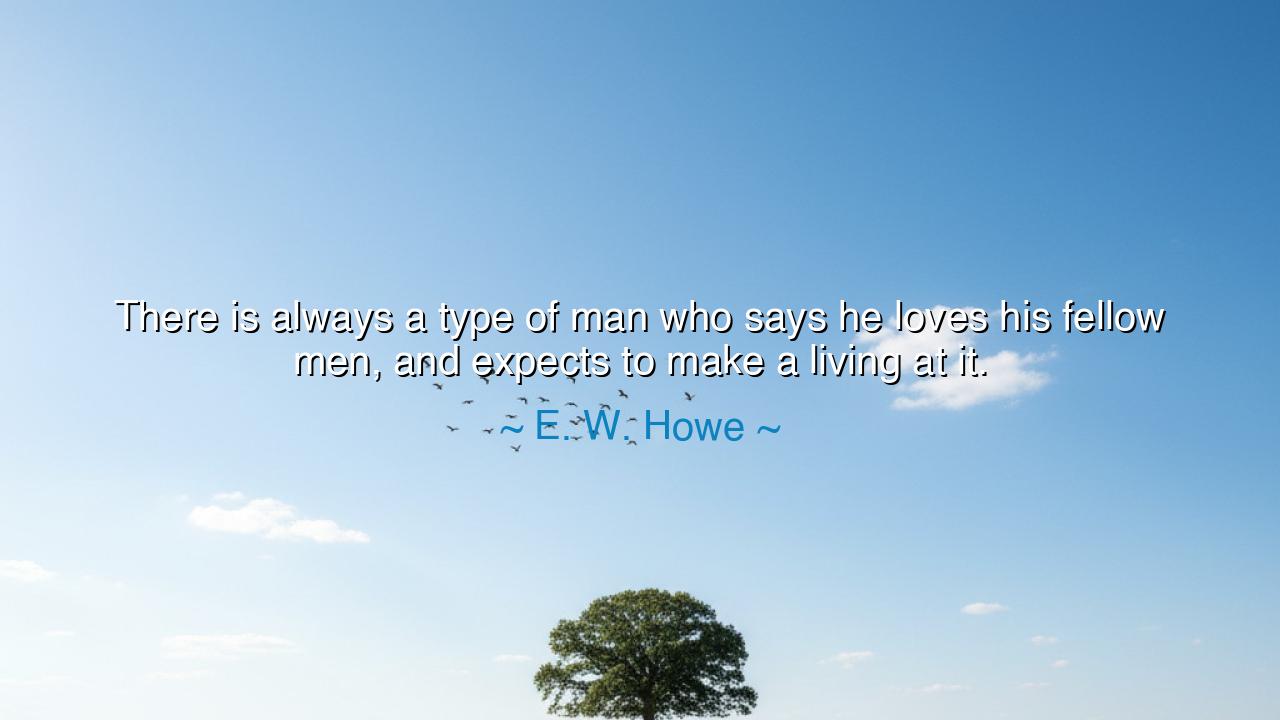
There is always a type of man who says he loves his fellow men
There is always a type of man who says he loves his fellow men, and expects to make a living at it.






The words of E. W. Howe, “There is always a type of man who says he loves his fellow men, and expects to make a living at it,” pierce through the ages like a cold wind of realism. Beneath their wit and cynicism lies a deep reflection on human nature and hypocrisy, on the fine line between genuine virtue and the performance of it. Howe, an American journalist and satirist of the late nineteenth and early twentieth centuries, was a keen observer of people and their motives. He understood that the world is filled not only with saints and sinners, but with those who disguise self-interest beneath the mask of compassion. His quote reveals that there will always be those who speak of love and brotherhood not as a calling of the heart, but as a means of profit—a trade of ideals for income.
In this brief, cutting statement, Howe captures a timeless truth: that charity, when divorced from sincerity, becomes commerce. The man he speaks of is not the one who quietly serves humanity, but the one who preaches service loudly so that the world may hear—and pay him for it. Such a man learns the language of goodness, but not its spirit. He becomes a merchant of morality, selling sympathy as if it were his own creation. And because people are often drawn to those who promise virtue, he finds an audience willing to reward him for saying what is noble, even if he never does what is right. In this, Howe unmasks a particular kind of deceit—not the deceit of hatred, but the deceit of false virtue, which is more dangerous because it hides beneath the guise of love.
Throughout history, this kind of figure has appeared in every age. Consider the rise of false prophets in ancient times—those who claimed to speak for the gods while filling their own coffers. They would cry out about love, salvation, and destiny, yet their temples overflowed with gold while the people they claimed to guide remained in ignorance. The philosopher Diogenes, who wandered the streets of Athens with a lantern searching for an honest man, mocked such pretenders mercilessly. He understood, as Howe did, that the more loudly a man proclaims his love for humanity, the more one should look to see whether he truly serves it—or merely profits from the performance.
There is also a more modern parallel. In every era, we see leaders, politicians, and public figures who claim to act “for the people,” while using that very claim to advance their own ambitions. They speak of unity, compassion, and justice—but beneath their speeches lies the hunger for power, for applause, for wealth. Howe’s wisdom reminds us that words of virtue are easy; acts of virtue are costly. The man who truly loves his fellow men does not need to advertise it, nor does he demand payment for his care. His reward lies in the peace of conscience, not in the coins of admiration.
Yet, Howe’s insight should not make us cynical toward all who speak of love or service. Rather, it teaches us to discern authenticity from performance. There are those who genuinely dedicate their lives to others—teachers who shape young minds for little pay, healers who tend to the sick without thought of reward, reformers who risk their lives for justice. These are the true lovers of mankind, who understand that love is not a profession but a devotion. They labor in quiet sincerity, not in pursuit of wealth, but because something within them refuses to turn away from suffering. It is they who stand as proof that the ideal of love can be lived, even in a world where so many counterfeit it.
The deeper meaning of Howe’s quote, then, is not merely a warning against hypocrisy, but a call to self-examination. Each of us must ask: do we serve because we love, or do we love because we wish to be seen serving? The true measure of compassion lies not in what we proclaim, but in what we sacrifice. The one who seeks to profit from goodness will always find an audience, for people long to believe in kindness; but the one who practices goodness quietly will find something far rarer—inner peace and lasting respect.
So let this teaching be passed down: let your love be real, not rehearsed. Do not seek reward for doing what is right, nor fame for feeling what is noble. Beware the temptation to wear virtue as a garment for praise; instead, let it live as the unseen pulse of your actions. As E. W. Howe reminds us, the world will always have those who speak of love but serve themselves. Do not be one of them. Be instead among those few whose kindness asks nothing, whose service needs no witness, and whose love for others is its own eternal wage.






AAdministratorAdministrator
Welcome, honored guests. Please leave a comment, we will respond soon